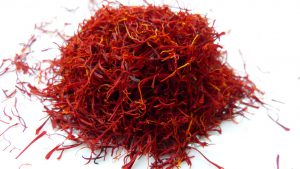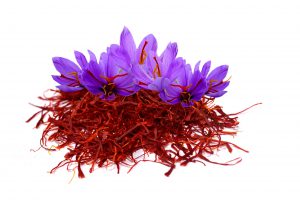Uses of Saffron
Saffron has been used as spice and coloring agent for many centuries and has numerous medicinal properties. It is by far one of the oldest herbs ever used for medicinal purposes in the history of mankind and up to this date it is being used in some regions of the world such as India.
Saffron is also used in many other industries such as the Food Industry, Dairy industry, Tobacco industry, Alcohol industry, Cosmetic industry for perfumes and facial creams, and the Dye industry.
Saffron pairs well with flavors such as apples, almonds, cardamom, honey, poultry (particularly heritage chickens and squab), bone marrow, milk or cream (try it in ice cream), cinnamon, lamb, seafood, garlic, white wine, vinegar, rose water, and citrus fruits.
Benefits of Saffron
- Saffron contains many plants derived chemical compounds that are known to have been anti-oxidant, disease preventing and health promoting properties.
- The flower stigma are composed of many essential volatile oils, but the most important being safranal, which gives saffron its distinct hay-like flavor. Other volatile oils in saffron are cineole, phenethenol, pinene, borneol, geraniol, limonene, p-cymene, linalool, terpinen-4-oil, etc.
- This colourful spice has many non-volatile active components the most important of them is alpha-crocin, a carotenoid compound, which gives the stigmas their characteristic golden-yellow colour. It also contains other carotenoids, including zea-xanthin, lycopene, a- and 6-carotenes. These are important antioxidants that help protect the human body from oxidant-induced stress, cancers, infections and acts as immune modulators.
- The active components in saffron have many therapeutic applications in many traditional medicines as antiseptic, antidepressant, anti-oxidant, digestive, anti-convulsant.
- This novel spice is a good source of minerals like copper, potassium, calcium, manganese, iron, selenium, zinc and magnesium. Potassium is an important component of cell and body fluids that helps control heart rate and blood pressure. Manganese and copper are used by the body as co-factors for the antioxidant enzyme, superoxide dismutase. Iron is essential for red blood cell production and as a co-factor for cytochrome oxidases enzymes.
- Additionally, it is also rich in many vital vitamins, including vitamin A, folic acid, riboflavin, niacin, vitamin-C that is essential for optimum health.
- Saffron is considered as a blood purifier and increase the oxygen content of blood. It is also used as Cardiac Tonic and helps in treating diseases those results from Vitiation of blood.
- Saffron kills bacteria, making it ideal for treating acne. Also, because of its anti-bacterial and exfoliating properties it helps in creating brighter and clearer complexion.
- Saffron protects brain cells by which brain strokes are avoided.
- Saffron helps in keeping cholesterol level in control.
- Saffron is the best blood purifier herbal product in the World, regular uses of saffron keep your skin healthy and glow. According to Ayurvedic medicine, saffron is one of the most effective skin lightning agents.
Storage of Saffron
Saffron should be stored in an airtight container and kept away from moisture and bright light. Bright light such as sunlight will bleach the color of saffron. That is why when the crocus flower blooms, the flower has to be picked at dawn (Sahar) before the sun shines on it. Also do not expose your saffron to the moisture. Do not open your jar of saffron near a boiling pot of water in the kitchen. To keep saffron fresh longer, store it in an airtight container away from heat, moisture and sunlight.



